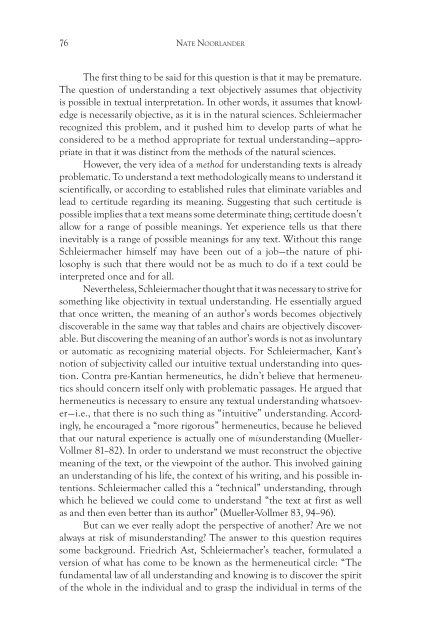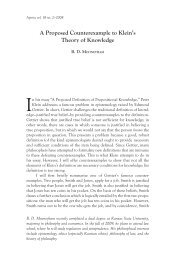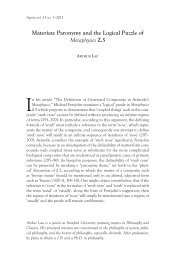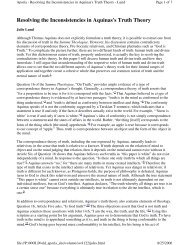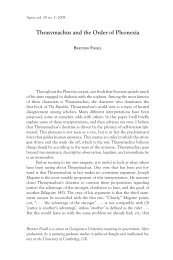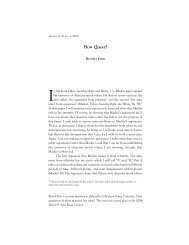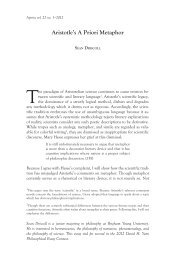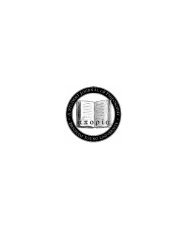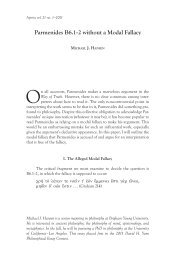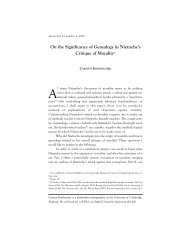Hermeneutics after Kant - Aporia - Brigham Young University
Hermeneutics after Kant - Aporia - Brigham Young University
Hermeneutics after Kant - Aporia - Brigham Young University
Create successful ePaper yourself
Turn your PDF publications into a flip-book with our unique Google optimized e-Paper software.
76<br />
Nate NoorlaNder<br />
The first thing to be said for this question is that it may be premature.<br />
The question of understanding a text objectively assumes that objectivity<br />
is possible in textual interpretation. In other words, it assumes that knowledge<br />
is necessarily objective, as it is in the natural sciences. Schleiermacher<br />
recognized this problem, and it pushed him to develop parts of what he<br />
considered to be a method appropriate for textual understanding—appropriate<br />
in that it was distinct from the methods of the natural sciences.<br />
However, the very idea of a method for understanding texts is already<br />
problematic. To understand a text methodologically means to understand it<br />
scientifically, or according to established rules that eliminate variables and<br />
lead to certitude regarding its meaning. Suggesting that such certitude is<br />
possible implies that a text means some determinate thing; certitude doesn’t<br />
allow for a range of possible meanings. Yet experience tells us that there<br />
inevitably is a range of possible meanings for any text. Without this range<br />
Schleiermacher himself may have been out of a job—the nature of philosophy<br />
is such that there would not be as much to do if a text could be<br />
interpreted once and for all.<br />
Nevertheless, Schleiermacher thought that it was necessary to strive for<br />
something like objectivity in textual understanding. He essentially argued<br />
that once written, the meaning of an author’s words becomes objectively<br />
discoverable in the same way that tables and chairs are objectively discoverable.<br />
But discovering the meaning of an author’s words is not as involuntary<br />
or automatic as recognizing material objects. For Schleiermacher, <strong>Kant</strong>’s<br />
notion of subjectivity called our intuitive textual understanding into question.<br />
Contra pre-<strong>Kant</strong>ian hermeneutics, he didn’t believe that hermeneutics<br />
should concern itself only with problematic passages. He argued that<br />
hermeneutics is necessary to ensure any textual understanding whatsoever—i.e.,<br />
that there is no such thing as “intuitive” understanding. Accordingly,<br />
he encouraged a “more rigorous” hermeneutics, because he believed<br />
that our natural experience is actually one of misunderstanding (Mueller-<br />
Vollmer 81–82). In order to understand we must reconstruct the objective<br />
meaning of the text, or the viewpoint of the author. This involved gaining<br />
an understanding of his life, the context of his writing, and his possible intentions.<br />
Schleiermacher called this a “technical” understanding, through<br />
which he believed we could come to understand “the text at first as well<br />
as and then even better than its author” (Mueller-Vollmer 83, 94–96).<br />
But can we ever really adopt the perspective of another? Are we not<br />
always at risk of misunderstanding? The answer to this question requires<br />
some background. Friedrich Ast, Schleiermacher’s teacher, formulated a<br />
version of what has come to be known as the hermeneutical circle: “The<br />
fundamental law of all understanding and knowing is to discover the spirit<br />
of the whole in the individual and to grasp the individual in terms of the


